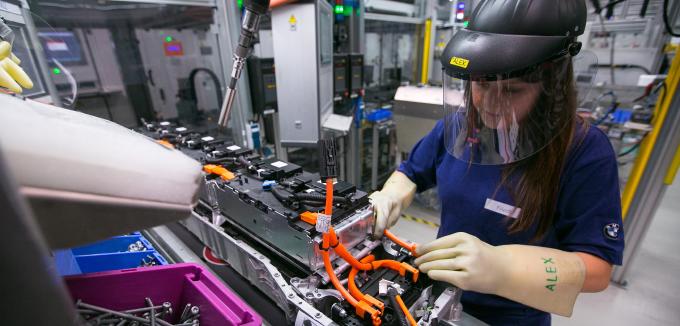Bloomberg via Getty Images
Production of electric car battery packs at BMW
The automotive industry is under power: The Volkswagen Group Show stock market chart wants 70 electric car models and 30 plug-in hybrid cars in the next ten years to offer, Daimler Show stock market chart introduced the Mercedes EQC at the beginning of September 2018, the first representative of his electric carSub-brand EQC. By 2022, the Swabians want to offer 10 pure electric car models. BMW Show stock market chart expands its range of electric cars, Tesla pushes with its entry-level vehicle Model 3 to Europe – and Japanese manufacturers as well.
To do this, the automakers have to buy large quantities of lithium-ion battery cells, especially in Asia, where a large proportion of the cells are currently being produced. The transport of the heavy cells is expensive. However, European car manufacturers and suppliers have not been able to achieve their own cell production for reasons of cost. This not only bothers employee representatives and some car managers who warn against dependencies. Even politicians in Germany and the EU fear that this will create jobs and value addedto be at stake.
Just over a year ago, the EU launched its own project to build lithium-ion cell factories in Europe. And there is a lot going on in the past few weeks. The automaker Volkswagen has now announced that it is moving forward with the establishment of a cell factory together with the Swedish startup Northvolt. In addition VW joins together with further partners to the consortium “European Battery Union”. The association, which also applies for EU funding, is run by VW and Northvolt.
At the end of 2018, Federal Minister of Economics Peter Altmaier has one Cooperation with Poland in the field of battery cellsThe goal is to build a joint cell production – in Lusatia and in western Poland. And Germany also wants to work with France on cell production.
Another project is in the starting blocks. The German battery specialist Varta plans a battery cell production together with Ford and thus applies for subsidies. The German projects should become part of a European joint venture – a kind of Airbus battery production, which should offer Asian manufacturers to stand up.
The Asian battery specialists, however, are already rushing ahead: They invest primarily in Eastern Europe, the first companies have already set groundbreaking. But European startups are also looking for opportunities: Startup Northvolt is already building a test production and wants to stomp a giant factory in northern Sweden from the ground, a German consortium also has big plans. We introduce the most important players in the big European e-car battery Monopoly.
page 1 of 10

